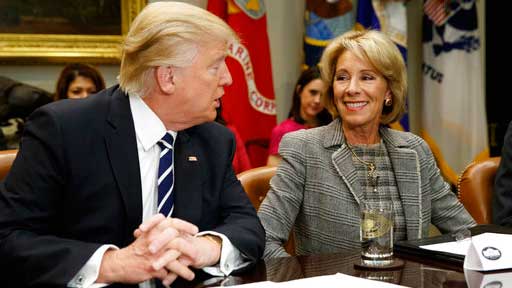
Maria Danilova | Associated Press
WASHINGTON (AP) — Even as fierce political battles rage in Washington over school choice, most Americans know little about charter schools or private school voucher programs. Still, more Americans feel positively than negatively about expanding those programs, according to a new poll released Friday.
“I wonder what the fuss is about,” said Beverly Brown, 61, a retired grocery store worker in central Alabama. Brown, who doesn’t have children, says American schools need reform, but she is not familiar with specific school options and policies. “Educational standards have to be improved overall.”
All told, 58 percent of respondents say they know little or nothing at all about charter schools and 66 percent report the same about private school voucher programs, according to the poll conducted by The Associated Press-NORC Center for Public Affairs Research.
Charters are schools funded by taxpayer money, but they operate independently of school districts and thus have more freedom in setting their curriculum and hiring staff. Vouchers are publically funded scholarships given to low-income families to help cover tuition in private schools, including religious ones.
Using taxpayer money to aid struggling public schools or diverting it to fund more charter schools or make private schools available to more families has been hotly debated since Donald Trump was elected president. During the campaign, Trump promised to fund a $20 billion school choice program. He picked a long-time charter and private school advocate, Betsy DeVos, as his education secretary. Last week the president welcomed a group of students who were voucher recipients to the White House and asked Congress to work with him to make school options available nationwide.
Those efforts face fierce resistance from Democrats and teachers unions, who say that school choice drains funds from public schools while leaving charter and private schools unaccountable in terms of academic standards and civil rights protections.
Patrick McGuin, an education professor at Drew University, said he was surprised by the fact that most Americans had little knowledge about school choice options.
“That’s pretty remarkable given the growth and high-profile politics around charters,” McGuin said. “As much as policymakers are talking the heck about this, the debate really hasn’t permeated the general public’s discussion yet.”
Charter schools currently operate in 42 states and the District of Columbia. D.C. has only the federally funded voucher program, while 30 states have voucher or similar education choice programs.
Even though they are unfamiliar to many, Americans have largely positive reactions to charter schools and vouchers. While 55 percent of respondents say parents in their communities had enough options with regard to schools, about 4 in 10 feel that that the country in general would benefit from more choice. Forty-seven percent say they favor opening more public charter schools, 23 percent are opposed, and 30 percent feel neutral about it. Meanwhile, 43 percent of respondents support giving low-income families tuition vouchers for private schools, 35 percent are opposed and 21 percent don’t have a strong opinion either way.
Republicans are slightly more likely than Democrats to favor opening more charter schools, 53 percent to 42 percent, but there is little partisan variation for voucher programs. At the same time, opposition to vouchers is highest among those who have heard the most about them.
John Rekers, a 46-year-old mortgage broker in California, has five kids and all of them are attending charter schools. He believes charter schools are more innovative and progressive. “They are not so oriented to sitting at desks and doing stuff,” he said.
“The charter school is much better oriented in teaching children,” Rekers said. “They have higher standards.”
Marc Culbreath, a janitor in Philadelphia, spent several years renting a house in the suburbs so that his children could go to quality public schools, but when the family moved into the city, they were appalled by neighborhood schools.
“Kids in the city — their public schools are terrible,” Culbreath said. Culbreath sent his son, now in 10th grade, to a charter school and he is now on track to go to college. “They treat the kids in the city same as they treat the kids in the suburbs,” he said of the charter school.
But Madolyn Stall, 22, a college student in Kansas, doesn’t support voucher programs. “If you cannot afford to go to a private school, then public school is fine,” she said. “I don’t really want to pay more of my tax money to send people to private school when they can go to public school.”
About 7 in 10 respondents feel that both charter schools and private schools funded with taxpayer money should meet the same education standards as public schools. School choice critics point to the fact that most private school don’t need state accreditation to operate and that some private schools teach creationism in science classes.
Still, Americans are more likely to say that private schools, both locally and nationally, provide a good quality of education than say the same of public schools.
The AP-NORC poll of 1,036 adults was conducted April 20-23 using a sample drawn from NORC’s probability-based AmeriSpeak panel, which is designed to be representative of the U.S. population. The margin of sampling error for all respondents is plus or minus 4.0 percentage points.
Respondents were first selected randomly using address-based sampling methods, and later interviewed online or by phone.
___
Online:
AP-NORC: http://www.apnorc.org/
Copyright 2017 The Associated Press. All rights reserved. This material may not be published, broadcast, rewritten or redistributed.
